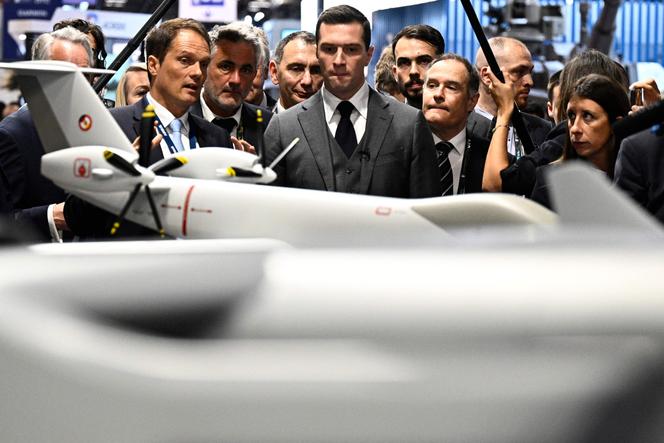


"Ukraine must be able to defend itself," said Rassemblement National (RN) president Jordan Bardella on Wednesday, June 19, confirming the repositioning of the far-right party, which for the past two years has been trying to distance itself from its previous support for Russia without completely dispelling the suspicion fostered by the party's persistent ambiguity on the issue.
Speaking at the Eurosatory global defense and security show in Villepinte (northeast suburb of Paris), Bardella did not specify what form aid to Kyiv might take if he were to become prime minister following the French parliamentary elections on June 30 and July 7. He did, however, make sure to define "red lines." He said that supplying long-range missiles and weapons likely to "strike Russian territory" was out of the question to "avoid any risk of escalation." Unsurprisingly, he also reiterated the RN's opposition to sending French troops to Ukraine, regularly evoked since February by Emmanuel Macron.
Bardella, in a further sign of the RN's diplomatic shift, said he "does not intend to call into question France's international" defense commitments. He stressed the importance of maintaining "credibility with our European partners and NATO allies," contradicting Marine Le Pen's pledge during the 2022 presidential campaign to leave the Alliance's integrated command in the name of France's "independence".
More embarrassingly, the RN candidate, who until the Russian offensive in Ukraine, previously expressed her "admiration" for Vladimir Putin, publicly advocated for "dialogue" and an "alliance with Russia on certain fundamental issues," such as European security, "which cannot exist without it," or the fight against terrorism, "which it has ensured more consistently than any other power." The part dedicated to defense in Bardella's policy platform, which included these commitments, has recently disappeared from the RN website. However, it remains accessible in the archives.
Bardella had already rectified the situation, in an interview with L'Opinion in February 2023, deploring the "collective naiveté" he felt the RN had shown toward the Russian president up until the February 24, 2022 offensive. The day after, Le Pen followed suit, denouncing a "clear violation of all legal principles" and a "political and moral error" in a letter to the French people. However, she did not endorse all the retaliatory measures imposed on Moscow. While she considered some of them "legitimate," the ones related to energy she described as "precipitate and somewhat ill-considered" for economic reasons. Despite this, there has been a notable change given that six months earlier she had called for them to be abandoned altogether.
You have 45.41% of this article left to read. The rest is for subscribers only.
